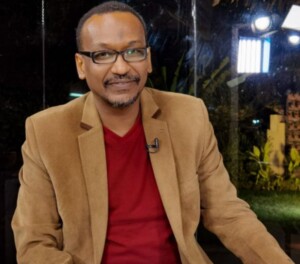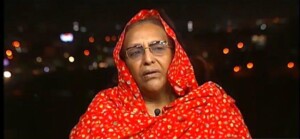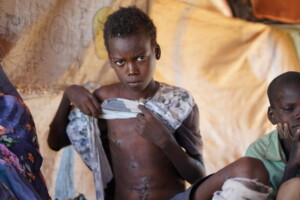Darfur displaced to resume protests against exit of UNAMID
Yesterday, Sudan’s Ministers of Defence and Interior Affairs discussed the security arrangements needed in Darfur after the departure of the UN-AU Mission in Darfur (UNAMID) on December 31. Displaced people in Darfur have resumed their calls for an extension of the mission’s mandate.
The ministers spoke about the implementation of the plan to achieve the rule of law and restore security and stability in Darfur. They reviewed the country’s security map, ensuring joint coordination to overcome the current challenges.
 Unamid troops escort WFP trucks from El Fasher to Shangil Tobaya (Albert González Farran / UNAMID)
Unamid troops escort WFP trucks from El Fasher to Shangil Tobaya (Albert González Farran / UNAMID)
Yesterday, Sudan’s Ministers of Defence and Interior Affairs discussed the security arrangements needed in Darfur after the departure of the UN-AU Mission in Darfur (UNAMID) on December 31. Displaced people in Darfur have resumed their calls for an extension of the mission’s mandate.
The ministers spoke about the implementation of the plan to achieve the rule of law and restore security and stability in Darfur. They reviewed the country's security map, ensuring joint coordination to overcome the current challenges.
Representatives from various Darfur camps for the displaced held a meeting at Kalma camp in Bielel, near Nyala, capital of South Darfur, yesterday, in preparation of protest actions planned for Saturday. They also agreed to resume the sit-in to demand the UN Security Council to reconsider its decision on ending the work of the joint AU-UN mission.
Sheikh Ishag Abdallah, head of Kalma camp, told Radio Dabanga that the decision to stop the mission's work by the end of this month “is unacceptable in light of the current security situation”.
He warned for further deterioration of the situation after the withdrawal of the UNAMID peacekeepers, and called for “alternative international protection if the mission will have to withdraw”.
Khalil Hasan, Director of the North Darfur Ministry of Social Welfare and spokesperson for the state government affirmed “the ability of the transitional government to provide security, stability and protection for the people living in various areas, especially in the camps for the displaced”.
Hasan said in a press conference in El Fasher yesterday that the security and peace-keeping forces, to be established in accordance with the Juba Peace Agreement, will be the main alternative to UNAMID.
Abbas Yousef, Humanitarian Aid Coordinator in North Darfur, added that UNAMID already withdrew from four of the last six sites in the state, including Saraf Omra, Kutum, Kabkabiya, Sortony, Tawila, and Shangil Tobaya, according to a fixed timetable.
Other UNAMID sites that will be handed over in the next phase will be designated for civilian purposes, voluntary return, and community stability, he said.
The coordinator of the Zamzam camp for the displaced south of El Fasher, Hasan Sabir, called for the necessity of an international alternative to UNAMID. At the same time, he affirmed his confidence in the regular forces and ex-rebel combatants “to fill the vacuum that will result from the exit of UNAMID”.
Continuing insecurity
On July 31, 2007, more than four years after the civil war erupted in Darfur, the hybrid peacekeeping mission was established, with the adoption of Security Council Resolution 1769. The mission was tasked with protecting civilians in the region, facilitate the delivery of humanitarian assistance, mediate between the Sudanese government and rebel movements, and provide support to community conflict mediation, in conjunction with UN country team.
Though the mission has been criticised more than once for not being able to fulfil its mandate, in particular the displaced in the many camps in the region, want UNAMID to stay, because of the continuing insecurity.
In May this year, a group of Sudanese civil society activists urged Prime Minister Abdallah Hamdok in a petition to add ‘physical protection’ to his request for a new UN mission to be deployed in the country.
Amnesty International urged the UN Security Council earlier this month to extend its mandate of the joint peacekeeping mission in Darfur by at least six months “in light of failure by government security forces to protect civilians in recent months”.
Minni Minawi, head of the split-off Sudan Liberation Movement faction SLM-MM and signatory to the Juba Peace Agreement, said at a press conference in Khartoum on Wednesday that he is opposed to the withdrawal of the UNAMID peacekeeping mission.
On the occasion of the approaching exit, UNAMID Joint Special Representative Jeremiah Mamabolo said in an interview by the UN press department. “Darfur is just beginning to change. The transitional government is just taking over now. [..] I say to the people in Darfur: Hang in there. The beginning is done. There is light at the end of the tunnel,” he said.
Radio Dabanga’s editorial independence means that we can continue to provide factual updates about political developments to Sudanese and international actors, educate people about how to avoid outbreaks of infectious diseases, and provide a window to the world for those in all corners of Sudan. Support Radio Dabanga for as little as €2.50, the equivalent of a cup of coffee.












 and then
and then